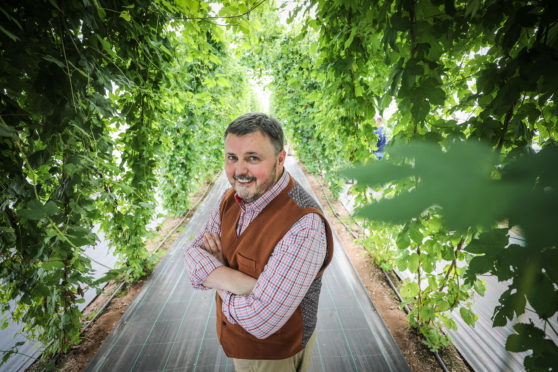Farmers have been challenged to capitalise on the results of a four-year trial which found a strong craft brewing market for locally-grown hops.
The experiment at the James Hutton Institute (JHI) at Invergowrie was
established in 2014 in response to growing interest in brewing and the development of premium beers, and culminated this week in the launch of a booklet guide for farmers who are interested in growing the crop.
The publication includes recommendations covering infrastructure, agronomic requirements, disease and pest threats, harvest and post-harvest handling.
JHI agri-food sector leader Professor Derek Stewart said he hoped the work done in the polytunnels at the institute had demonstrated the feasibility and potential of growing hops commercially in Scotland.
He added: “Hops are perennial plants that are usually cultivated in warm
temperate regions, and although historically they have been grown as far north as Aberdeen, they remain a rare crop in Scotland.
“There are more than 130 distinct craft brewers in Scotland and they all use hops that are imported.
“Most of these brewers can see value in having purely Scottish hops.”
Local fruit farmers including Stewart Arbuckle from Dundee and Tim
Stockwell from Barnsmuir farm, Crail, attended the launch and said the
prospect of being able to use mechanical harvesters on the crop was an attraction, but more work needed to be done on potential margins.
Mr Arbuckle said: “We need a better understanding of the market and any development needs to be led by demand.
“It’s a complex industry so we’d need brewers to tell us the variety and flavour profile they want us to grow.”
Brewdog research scientist Dzeti Zait was one of several brewers represented at the launch. She said the company would be keen to use locally-sourced hops.
She added: “We source all our hops abroad so to have them on our doorstep and be able to have that provenance would be great.”
Prof Stewart suggested hops could be suitable for soft fruit growers who are used to the polytunnel system and said it might be feasible for a farming cooperative to supply 20-30% of the market.
nnicolson@thecourier.co.uk










